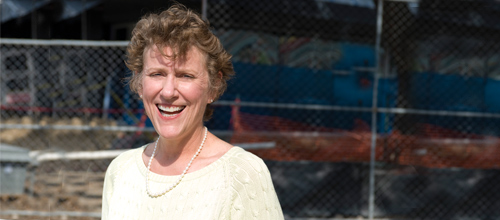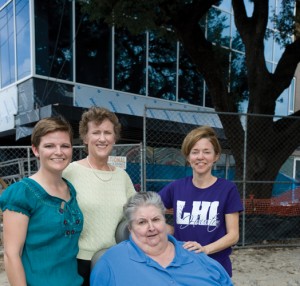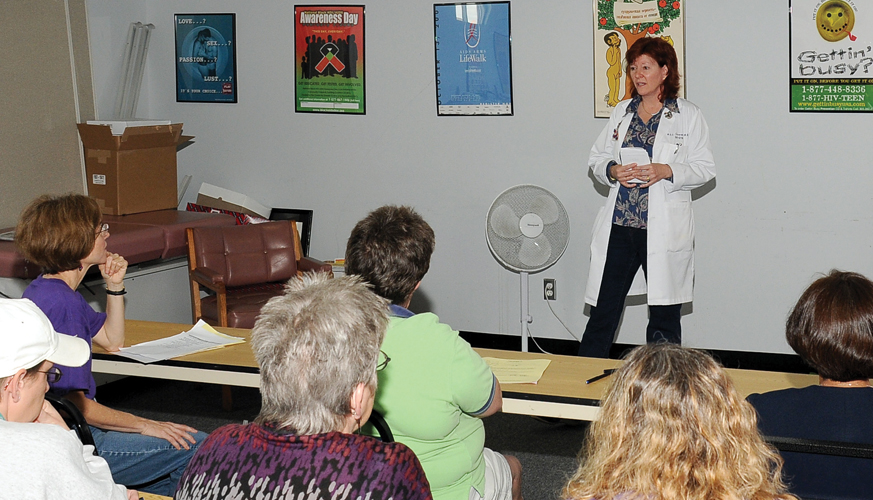Under Construction
Lesbian Health Initiative’s first chief executive officer, Liz James, aims to expand scope of the LGBT women’s healthcare nonprofit group
by Nancy Ford
Photo by Mark Hiebert
In 2002, OutSmart asked Lucy Watson, then president of Lesbian Health Initiative Houston, what she foresaw for the future of the organization addressing lesbians’ health issues. Watson said that LHI would certainly continue providing mammograms, but she also hoped the organization would “do more in the way of education to address heart disease, lung cancer, whatever those diseases are that are targeting women.”
Ten years later, Lesbian Health Initiative Houston is doing exactly that, and so much more. Since its founding in 1993, LHI has grown from an all-volunteer organization that provided mammograms and basic wellness screenings like blood pressure readings, to a well-rounded, nationally respected organization serving hundreds of Houston-area lesbians each year.
In March, the nonprofit organization’s board of directors took another major step toward its mission of “eliminating barriers to health care for LGBT-identified women through programs that provide education, access, and advocacy” by hiring its first full-time chief executive officer, Liz James.
When James speaks of LHI and discusses her own vision for the organization, her excitement and passion are palpable. “That’s attributable to two things,” James explains. “One, from my 30-plus years of experience in the for-profit sector, doing business development and management, the way I approach things is to really do my homework, to understand opportunities.”

Then, too, there is a personal connection that makes James even more sympathetic to LHI’s mission.
“I am somebody who is delighted to say that I am a cancer survivor,” James reveals; she was diagnosed with melanoma in 2005. “I am also somebody [who has] a zero detectable viral level with Hepatitis C. So I’ve had some pretty impactful health issues.”
Unlike many women diagnosed with similar health challenges, James had adequate health insurance and access to quality treatment.
“You know, it was very costly to get me healthy,” James says. “I don’t see myself as any more privileged than anyone else on the planet, so from that perspective I have a tremendous degree of passion and conviction about what LHI’s objectives are,” she says.
James joined LHI as one of the group’s many dedicated and passionate volunteers in 2010. In February 2011, she was an integral part of the team that produced the organization’s annual fundraising gala, the Celebration of Love, which broke previous attendance and financial records.
“The success of our gala each year gives LHI the opportunity to provide greater community awareness of LHI’s life-saving programs, as well as additional resources to effectively expand those programs,” James says.
James, 56, doesn’t mince words when considering the challenges that lay before her. One of the key barriers to lesbians’ health is what James calls “a tremendous lack of culturally competent care on the clinician side of the coin.”
Lesbians are at increased risk for breast, ovarian, and lung cancers and obesity-related illnesses including diabetes and heart disease, yet they see physicians for exams less frequently than heterosexual women, leading to later-stage diagnosis and more negative outcomes. Further, healthcare providers are often not aware of all of the factors that heighten lesbians’ health risks, such as lower rates of childbirth, higher rates of alcohol consumption and smoking, and higher overweight and obesity levels.
Finally, universal barriers like cost, scheduling, discomfort, competing life demands, and embarrassment can be compounded by feared and actual past discrimination.
“These experiences are more common among LGBT women and, to a much greater extent, to those with little or no health coverage and limited financial resources, which limits their flexibility in choosing a provider,” James says.
The fact that Texas has the highest uninsured population in the U.S., and Harris County has the highest uninsured population in Texas, James says, makes the services LHI provides even more essential.
| ________________ |
LHI is currently connecting the community it serves via Facebook and other social media tools. It also provides its clients and supporters with electronic newsletters which are posted online three times a year, increasing awareness and providing education regarding LGBT women’s health issues, services, and public policy. But James intends to expand LHI’s scope to stretch far beyond the local level to state and national levels on behalf of LGBT women, increasing awareness of and promoting public policies addressing healthcare needs and the barriers LGBT women face.
“LHI is eliminating barriers to healthcare for LGBT-identified women by providing education so they know what their needs, rights, and services are. We’re providing them access, so that they can get culturally competent care to live healthier lives, to be alive, and to get diagnosed.
“LHI’s previous president in the last two years, Ann Pinchak, did an amazing job revitalizing the organization and really solidifying our education and health fair-related programs,” James continues. “She did that by creating sustainable processes around those programs, and recruiting new blood in the organization.
“Most nonprofits get challenged because people get involved over the long haul and get fatigued. Ann really refreshed the organization not only organizationally and program-based, but also in attracting key volunteers.”
James also praises Pinchak for developing and expanding LHI’s funding through community-granting organizations. Bunnies on the Bayou, Empire of the Royal Sovereign Imperial Court of the Single Star, Hollyfield Foundation, John Steven Kellett Foundation, Kindred Spirits Foundation, Krewe of Olympus, Alice Kleberg Reynolds Foundation, and numerous individuals are among LHI’s funders.
Pinchak also designed LHI’s new “Train the Trainer” program, providing › culturally competent training to healthcare providers. “We will be looking before 2011 is over to launch that program,” James says. “We will also be looking very closely at our existing provider network so we can expand our ability to provide healthcare for our target communities through the existing network we have.”
| ________________ |
Building on Pinchak’s success of solidifying the “program portion” of LHI is Wendy Oehlman, LHI’s new Health Programs Chair, who represents LHI’s “future face,” James says.
“Wendy, who is also our Health Fair Chair, is an incredibly talented young woman who is an LVN and was in the armed services as a sergeant. She has not only great clinician skills but great organizational skills as well,” James says. “Wendy is key to LHI and our health fair delivery. She has been able to improve those processes so we can bring those women through the system and serve more women. She’s figured out how to do an arrangement for the June fair. We’re going to be able to see a number of more women on some of the tests we do, just because she has improved the check-in and registration process. It’s amazing!”
James expects the June health fair to serve approximately 150 women, and wants to double that figure for the November fair.
LHI’s partner to deliver vital health services to their constituents is Legacy Community Health Services. “Legacy provides a variety of services, like blood and Pap screenings,” James says. “They are Harris County and the City of Houston’s largest Federally Qualified Health Center, and there’s a lot of opportunity for us to expand our reach to our target community by expanding our relationship with Legacy. As many people know, Legacy has a big capital project that will grow their Montrose-area clinic substantially. That’s going to really provide the ability for us to really expand our health fair in November 2011.”
The eventual goal, James says, is to provide expanded healthcare support for LGBT women at Legacy Community Health’s various clinics throughout Houston, not just in Montrose. “One of the ways we will do that will be through expanding our relationships with our providers, using vouchers to provide access to those services,” she says. “MD Anderson and The Rose are our mammogram partners, providing on-site mammograms as well as vouchers for exams for use at a later date.”
Participation in the June health fair marks the first time MD Anderson’s Melanoma and Skin Center provide skin cancer screenings to LHI’s clients. “I’m excited about that, being a melanoma survivor,” James says. “And this is very exciting since heart and vascular illnesses are the primary reason why women die in this country. We will also be working with the Women’s Heart and Vascular Health organization, part of the Texas Health Institute at St. Luke’s Episcopal Hospital, working with the clinician team to provide attendees information about their heart and vascular risks. Post-health fair, we’ll also have the ability to marry that with blood tests that we take to provide extended value.”
Dental health is important to overall health, so for the second time, the staff of Glenda G. Owen, DDS, will be there to provide dental tips as well as resources for low- and no-cost dental care in the Houston area.
Additional June health fair offerings include Cathedral of Hope Houston’s Lynette Ross, who discusses Meditation & Mindfulness and Your Health; and Mary Jean Tiernan, certified fitness trainer, who discusses fitness and nutrition. CVS Caremark will also be on hand to provide information regarding discount prescriptions. At the November health fair, they’ll do flu shots. Montrose Counseling Center is also one of LHI’s health fair partners.
“We’re very, very excited about these new relationships and we’ll have more in the future. We’re offering a lot of opportunities, as we have in the past.”
| ________________ |
The solidifying of the group’s health programs, coupled with the success of its funding programs, James says, well-positions LHI to move to the next step.
“That next step is really creating a “‘best practice’-based, professionally run nonprofit,” James says. “The ‘best-practice-based’ means you adhere to business and operational structures that are best practiced from the nonprofit sector. My job as CEO initially is to put those business structures into place. We’ve got the bylaws already done—that was done very quickly—and we are in the process of recruiting additional board members.” James says the board has also elected a treasurer, Janice Martinez, a CPA who is also a vice president of accounting services for SavaSeniorCare, a billion-dollar nonprofit healthcare provider.
Once the group’s infrastructures are put into place, James is also responsible for more fundraising for the organization. “One of my objectives is to work with the board as we develop it, to do a strategic three- to five-year plan. I will sit as the chair of the development committee because I have › had about 30 years’ experience in business development in conjunction with my most recent studies at the Center for Philanthropy and Nonprofit Leadership at Rice University.”
As CEO and leader of the organization, James also expects to advise boards and advocate on behalf of the organization. “Community and public relations are a big part of my job. And planning, obviously. I’m responsible for working with the team to create clearly defined programs and budgets for those programs.
“Last but not least,” she says, “we have established what I call a ‘new and collaborative advocacy program.’ We have joined forces with the Texas Breast Health Collaborative, National Coalition for LGBT Health, and One Voice Texas. We believe that it is important to be working in collaboration with other organizations on a local, state, and national level to advocate for and on behalf of our target constituents so that our healthcare policies, education, and training are addressed on a policy level.
“LHI is available—we want to help you,” James concludes. “All you have to do is e-mail or call us, and we’ll be there.”
www.lhihouston.org • 713/426-3356 • [email protected] • www.FacebookLHI-Houston












Comments